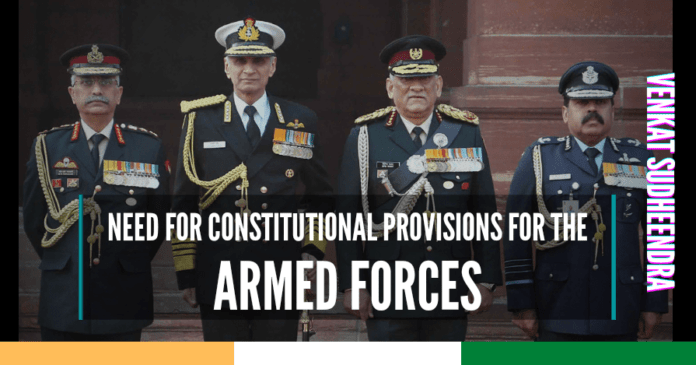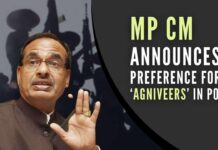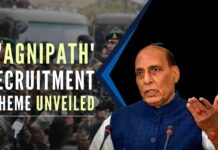
Several confidence-building measures failed to produce any tangible outcomes in the relationship between Indo-China
The recent Galwan valley face-off between the Indian and Chinese forces in Ladakh has come as a total shock to the country. This was the first time since 1962 that the Indian and the Chinese side have had such a violent face-off resulting in the death of 20 Indian soldiers which include a Commanding officer.
Despite several confidence-building measures and almost 14 meetings in 6 years between the leaders of two great Asian powers with all the ‘jhoola and nariyal pani’ hug-diplomacy of PM Narendra Modi, it has failed to produce any tangible outcomes in the relationship. Betrayal, loss of strategic positions & compromise on territorial integrity is all that India has got through this style of diplomacy.
This has given way for a total compromise of national security and also dented the morale of our soldiers to some extent. Currently, the Army needs to be given a free hand to deal with exigencies but it is not empowered to do so.
This incident calls for an urgent political intervention that is necessary to avoid an embarrassment in the future. This face-off could have been prevented if there was a clear cut line drawn between the foreign policy and the defence policy. The BJP government’s over-reliance on foreign relations to substitute defence spending has cost this, this was the same mistake which Former Prime Minister Jawaharlal Nehru and even Atal Bihari Vajpayee did with China[1].
Till date, the Chinese haven’t backed off from their positions which have all throughout been part of the Indian territory. For close to 2 months, India is still engaging in talks with the Chinese counterparts at various levels to de-escalate and disengage but so far there has been no reciprocation from the Chinese side.
These talks with the aggressor have given them sufficient time to galvanize their troops and occupy key strategic positions along the Line of Actual Control (LAC). We have been pushed to a scenario where we are desperate to have talks while they are galvanizing troops. These kinds of talks and diplomacy compromising national security precede every time with India because of the bureaucratic structure on the Indian side.
The bureaucratic structure is the civilian cadre which rules the armed forces. Each and every decision relating to the security is taken by them at various levels. This has given way for a total compromise of national security and also dented the morale of our soldiers to some extent. Currently, the Army needs to be given a free hand to deal with exigencies but it is not empowered to do so.
The civilian cadre, unfortunately, has no clue about the ground realities of border security but they have been blessed with the privileges to lead those in the front line which is the Army.
We are in such a bad position that we take so much time to procure just 36 next-gen fighter Aircraft from France to substitute our ageing soviet-era aircraft while the neighbours are modernizing their forces that threaten our integrity and security.[2]
Although both the civil services and the military services come under the same umbrella called the public service under the Constitution, there is differential treatment for the Army in the Constitution. The Public Service Commission (i.e. Civilian) has a clearcut edge over the armed forces. The Public service Commission has constitutional backing in several articles such as Article 315(Chief Election Commissioner), Article 324 (Chairman Union Public Service Commission), Article 149 (Comptroller and Auditor General) etc. They all are chosen from the bureaucracy which is mostly dominated by IAS, IPS and IFS officers.
Everywhere the civilian cadre i.e. the bureaucracy has its grip, this includes the defence and national security. The Cabinet Secretary and the Defence secretary who are chosen from the bureaucracy have more privileges and powers than the Chief of the Army staff, right from order of precedence to the decision making aspect in the policy. The civilian cadre (which includes the police) supersedes the military counterparts in almost every rank.
The civilian cadre, unfortunately, has no clue about the ground realities of border security but they have been blessed with the privileges to lead those in the front line which is the Army.
The current system can be described as a soldier having the best spirit to fight with his gun but every time he has to go to the office of the civilian ‘superiors’ to even load it with bullets.
The armed forces despite falling under the same Public Service Commission and also the union list of subjects i.e. under the 7th Schedule of the Constitution, it is governed mostly by a statute which is the Army Act. Although the act guarantees a certain level of autonomy in the functioning and the administration of the armed forces, it is insufficient. As of today the Constitution does not give any direction for the state or mandates the state to consider the armed forces when the matters concern the security, sovereignty and integrity of the state.
The Directive principle of state Article 51 states that “the state shall promote International peace and security,“ if this “security” has to be taken into actual context, India should actually be striving to protect the interests of Sindh, Balochistan, Pashtun, Kurdistan, Tibet and several other regions surrounding the Indian subcontinent where there is a police state deployed to snatch the life and livelihoods of the natives but so far it has not strived for it except the usual bureaucratic press note from the Ministry of External Affairs condemning the action.
Even today many argue that this Directive principle is not “enforceable” and these are mere directions to the state by the Constitution but the catch is that one should read this Directive principle along with Article 37 which gives a direction to the state stating that “it shall be the duty of the State to apply these principles in making laws.” Therefore going by these 2 Articles i.e. Article 37 and Article 51 (taken together), the state is entitled to make laws to promote security.
The allocation for defence in the budget has so far been arbitrary and the Finance Ministry has an extraordinary advantage over here and this needs to be checked and this commission should act as a vigilant security advisor to the Finance Ministry.
What can make it work?
The first step for the Indian state to promote security at an international level is to guarantee security at a national level, this can be done by empowering the armed forces of this country and giving them a constitutional voice. This can be done by decoupling the security forces from the bureaucratic system i.e. from the clutches of the UPSC.
From the ground level till the top, right from the recruitment of Army personnel through NDA (National Defence Academy Examination), CDSE (Combined Defence Service Examination), awarding them degrees via JNU (Jawaharlal Nehru University) and even superseding them in the order of precedence the entire structure affiliated with the security service personnel must be decoupled.
Recently we have seen that the government has decided to decouple the Indian Railways from the UPSC, although it is a welcome step, we should see how it is working out. We must note that the principal reason for decoupling is that they wanted to have a leaner administration in railways, for the Army, the principal reason for decoupling them from bureaucracy should be to hear them out and give them complete autonomy for their functioning and decision making and not leaner administration.
The second step would be to set up a separate constitutional body which is the Union Security Service Commission/ Union Defence Service Commission. This body should take over the entire task which was previously with the UPSC i.e. right from recruitment to training. The Chairman and its members should be chosen only from the armed forces and at no point, there should be any kind bureaucratic appointments or interference. The Chief of Defence staff should be the overseeing authority and the Chairman should have a direct connection with the Prime Minister and the Defence Minister with no intermediate secretaries involved.
The third and the most important step would be to constitute a Defence Expenditure Commission, once again only from the armed forces, in the lines of the Finance Commission giving constitutional powers to give out the recommendations pertaining to the pecuniary aspects of the armed forces & especially those concerning the modernization of the armed forces.
This body should be entrusted to prepare the Annual Defence Policy and table it in Parliament. The commission’s recommendation should have provisions to supersede those from the Finance Ministry in an adverse scenario or a tense situation in the subcontinent.
Currently, our defence expenditure YoY is ~1.6% of the GDP (the least in the subcontinent) and most of it goes into the operation of the forces, salaries, pensions etc. thus the money that is left over is totally insufficient for any kind of modernization. Also, the allocation for defence in the budget has so far been arbitrary and the Finance Ministry has an extraordinary advantage over here and this needs to be checked and this commission should act as a vigilant security advisor to the Finance Ministry.
These measures would ensure that the guardians at our borders, not just have a sophisticated weapon but assurance that they are fully loaded with bullets.
References:
[1] Vajpayee kowtows to China – Jul 8, 2003, Japan Times
[2] India’s defence policy challenge – May 08, 2019, ORF Online
- Bharat must bring back the world’s renowned empire builders – The Zoroastrians (Parsis) deserve a permanent global Indian citizenship & permanent representation in the Lok Sabha - June 23, 2022
- Hindu State Part 3: The Hindu State is possible with the synergy of 4 wings of Hindutva – Street Hindutva, Intellectual Hindutva, Tech Hindutva, and Virat Hindutva on stand-by - May 1, 2022
- The Hindu Vivaaha: A prosperity enhancing ceremony under siege, why educated Hindu youth should understand the financial & economic advantage of getting married young - February 18, 2022











If your guns need to be loaded you are already late. Very very LATE.
You need to know what the enemy is up to in the planning stages. If you can’t stop them from contemplating the attack, stop them from mobilizing. If that doesn’t work stop them from positioning. Only then should you want to fight. Good to be ready and loaded but you need better intelligence.
We support this whole hearted. We must need a set up like US army has. Now President rump could by pass all Bureaucratic set up for National defense matter. PM Modi should take up this issue on very urgent basis before anything really bad happens to India.